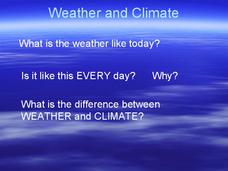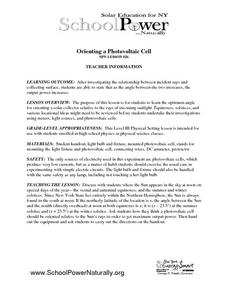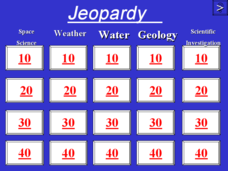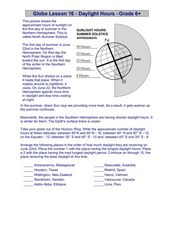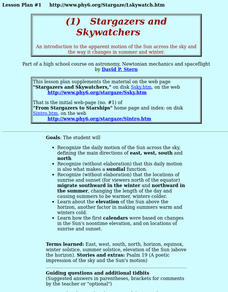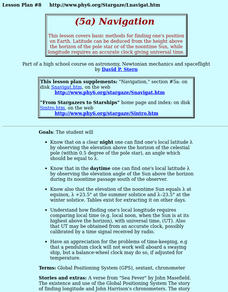Teach Engineering
Solar Angles and Tracking Systems
The sun will continue to rise in the east and set in the west, no matter what. The first lesson in a series of eight introduces the class to solar angles. It makes connections between a person's latitude and the angle of position of the...
Curated OER
Weather and Climate
It's hot today, but is that the weather or the climate? This colorful presentation isolates both concepts to allow for better understanding by covering the positioning of the planet, making comparisons of land versus water, and looking...
Curated OER
Orienting a Photovoltaic Cell
Students explore the optimum angle for orienting a solar collector relative to the rays of incoming sunlight. They review equinoxes, solstices, and various locational ideas before students investigate using meters, light sources, and...
Curated OER
Stargazers and Skywatchers
High schoolers are introduced to the apparent motion of the Sun across the sky and the way it changes in summer and winter.
Polar Bears International
Top of the World
Learn about polar bears and the Arctic circle with a lesson about the countries and conditions of the region. After examining how the area differs from Antarctica, kids explore climates, animals, and geographical position of countries in...
Curated OER
What Causes Day and Night?
Why do we have four seasons? A series of questions about the Earth's orbit and its impact on seasons challenge Earth science students.The second page of the resource has nine multiple choice questions, such as "One year on Earth is one...
Curated OER
From Light to Dark and Back
Experiment with light and dark in a series of interactive activities that lead up to reading and writing poetry. Class members have the opportunity to observe their feelings while sitting in the light and dark and to play with shadow...
Curated OER
Jeopardy - Earth Sciences
Questions about water, weather, geology, astronomy, and the scientific process make up this Jeopardy game. It is a pretty well-rounded set of slides, although you may want to be aware that a few of the questions are specific to the state...
Curated OER
Fall Lesson Plans
Fall lesson plans can combine science, history, and writing into an enticing combination.
Curated OER
The Reasons for the Seasons
Young scientists use a globe and a light to simulate the rotation of the earth and sun to show the seasons. Additionally, they simulate direct sunlight and indirect sunlight showing intensity of the sun, and answer questions based on...
Curated OER
Globe Lesson 16 - Daylight Hours
In this geography skills activity, students read an instructional passage regarding daylight hours and then respond to 5 short answer questions.
Curated OER
Was Kepler Correct?
Students investigate the elliptical orbit around the Sun. They use the information gathered to measure the distance to the Sun from the closest orbital point and the farthest orbital point.
Curated OER
Geology Word List
In this science worksheet, students review the vocabulary words for the separate categories related to the concept of geology.
Curated OER
Weather Word Problems
In this weather worksheet, students complete 5 short answer questions comparing and contrasting daylight hours at different locations around the world.
Curated OER
How Much Longer is the Day?
In this daylight hours worksheet, students use pictures given to write a number sentence and calculate the answers. This worksheet has 3 word problems.
Curated OER
Working with Sinusoidal Models
In this sinusoidal model instructional activity, students use the sinusoidal model to solve word problems about the hours of daylight in Anchorage, Alaska. Students complete 5 problems.
Curated OER
Stargazers And Skywatchers
Young scholars recognize the daily motion of the Sun across the sky, defining the main directions of east, west, south and north. They see how the first calendars were based on changes in the Sun's noontime elevation, and on locations of...
Curated OER
Stargazers and Skywatchers
Students observe the daily motions of the sun and relate them to the functions of a sundial. They determine the locations of sunrises and sunsets and determine how the elevation of the sun effects temperature.
Curated OER
Visiting the Arctic Circle
Students familiarize themselves with the Arctic Circle by locating it on a globe and wall map. They discuss they climate in the North Pole and the reasons for its low temperatures. They compare and contrast the climates of the Arctic...
Curated OER
Tracking Sunrise and Sunset
Young scholars collect, record, and graph the sunrise and sunset times. They explain how the relationship between the tilt of Earth's axis and its yearly orbit around the sun produces the seasons.
Curated OER
Navigation
Students study the basic methods for finding one's position on Earth. Latitude can be deduced from the height above the horizon of the pole star or of the noontime Sun, while longitude requires an accurate clock giving universal time.
Curated OER
The Celestial Sphere
High schoolers are introduced to the celestial sphere, describing its apparent rotation and the special role of the pole star.
Curated OER
Seasons in 3D: Student Exploration
In this seasons exploration worksheet, students review vocabulary and answer prior knowledge questions, then use the Seasons in 3D Gizmo to complete exploration activities.
Curated OER
Reasons for Seasons
Learners track photoperiod (daylight hours) over time and predict how daylight change during different seasons. This helps build their understanding that ever-changing daylight is the driving force for migrations and all other seasonal...



